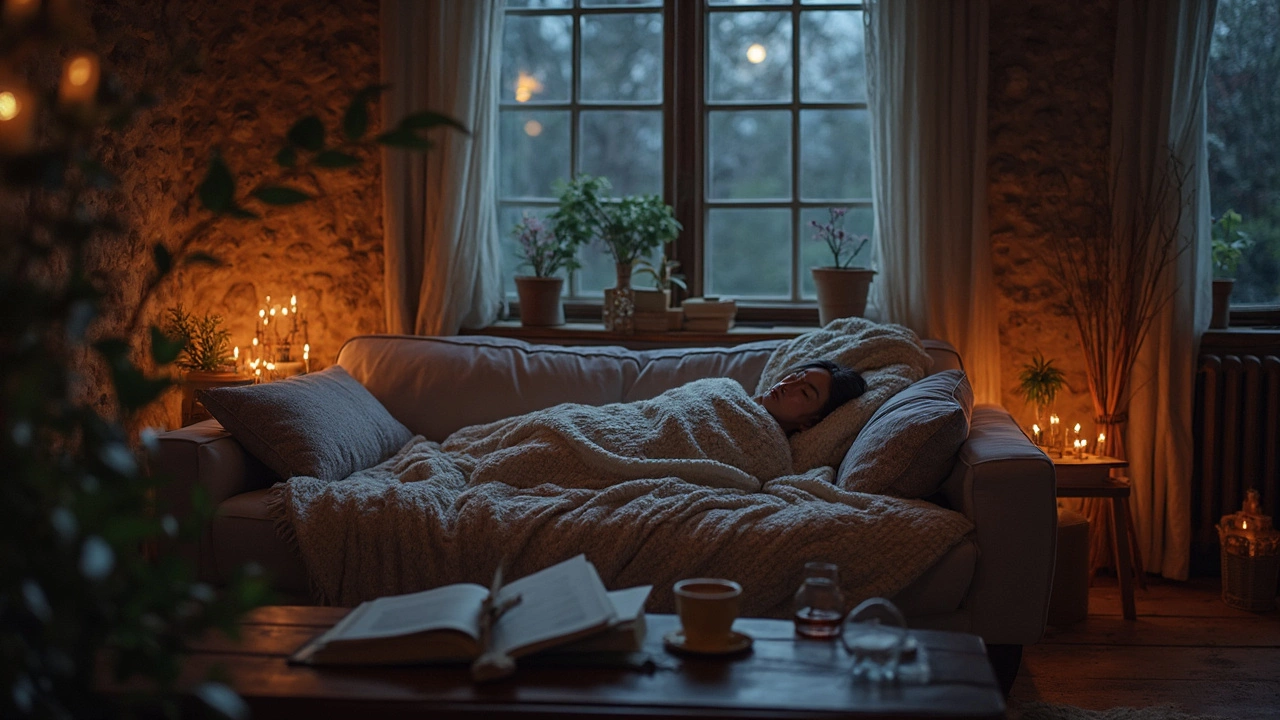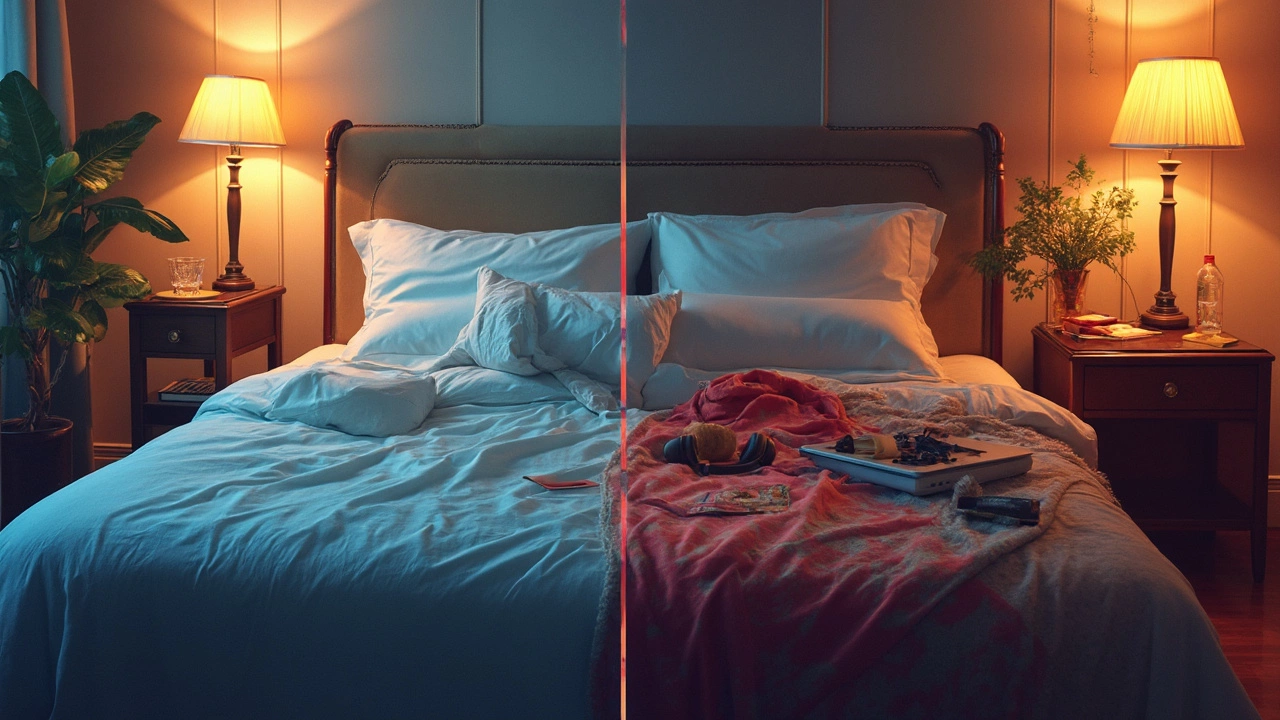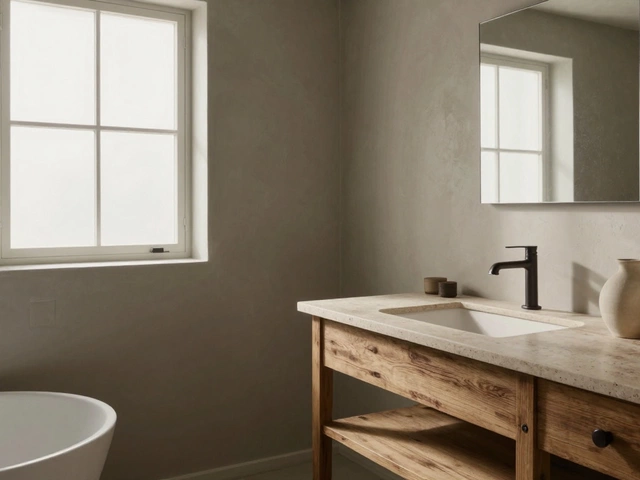
We've all spent the night on the couch at some point, whether dozing off during a movie marathon or crashing after a late night. But what if your couch becomes your regular sleeping spot? It might sound convenient, but snoozing on the sofa every night could have some surprising effects on your well-being.
First up, there's the matter of comfort. Sofas aren't designed for long, restful nights. They lack the support a bed provides, which could lead to back or neck discomfort over time. Not to mention, most couches aren't as spacious as a bed—meaning you're more likely to end up in pretzel-like positions.
- Couch vs. Bed: Understanding the Difference
- Health Implications of Couch Sleeping
- Comfort Matters: How to Enhance Your Couch Sleep
- When Couch Sleeping Becomes a Problem
- Couch Upgrades: Make It Bed-Worthy
- Alternatives to Frequent Couch Sleeping
Couch vs. Bed: Understanding the Difference
Understanding the difference between a couch and a bed is crucial if you're considering couch sleeping over the traditional bed. Let's break down what sets them apart.
Design and Purpose
First off, couches and beds are designed with different purposes in mind. A couch is primarily for sitting, lounging, and socializing, with comfort spread across the seat. Beds, on the other hand, are crafted with sleep in mind, focusing on support and alignment.
Support and Comfort
Beds offer a consistent support level due to their structure—consisting of a mattress that evenly distributes body weight. This support reduces pressure points, promoting better spinal alignment. In contrast, sofas typically have cushions that create uneven surfaces, possibly leading to discomfort if used for sleeping regularly.
Space and Positioning
Consider the space available. Even the largest sofas don't match the size of a double bed. You might find yourself feeling cramped on a couch, which could cause poor sleep quality. Beds also allow more freedom for movement, letting you shift positions through the night without restrictions.
Lifespan and Durability
Beds are built to withstand nightly use for years, featuring robust frames and durable mattresses. Sofas, even those that convert, aren't usually made with nightly sleeping in mind. Frequent use as a bed can wear down a sofa faster, impacting its lifespan.
Table: Quick Comparison of Key Features
| Feature | Bed | Couch |
|---|---|---|
| Purpose | Designed for sleep | Designed for sitting |
| Support | Evenly distributed | Varies, often uneven |
| Space | More available | Less available |
| Durability | Long-term use | Wears faster with sleeping |
These differences highlight why substituting a couch for a bed requires some thought. It's not just about comfort—there's a lot more at stake!
Health Implications of Couch Sleeping
Sure, couches are cozy for an afternoon nap, but using your sofa as a nightly sleeping spot might not be the best idea health-wise. Let's break down some potential issues you might encounter if you're constantly opting for couch sleeping.
Sore Morning Muscles
A regular bed is designed to support your entire body while you sleep, helping maintain proper alignment. Couches, however, are usually made for short bouts of sitting and lounging. That means you might wake up with aches, pains, and a stiff neck due to the lack of proper support.
Quality of Sleep
You might crash quickly on the couch, but the quality of your sleep can take a hit. Without the comfort and space of a bed, you may find yourself tossing, turning, and not hitting those deep sleep stages. This lack of restorative sleep can affect your mood, concentration, and even your immune system.
The Dust Factor
Believe it or not, spending more time on your couch might increase your exposure to dust mites and other allergens. Sofas don't usually get the same regular cleaning as beds, which can exacerbate allergies or breathing issues.
Posture Problems
Sofa sleeping can influence your posture, especially if you're curling up in weird positions to fit the couch. Poor alignment while sleeping can lead to long-term problems such as chronic back pain or even contribute to issues like sciatica.
In furniture tips, it’s important to think about more than just convenience. While occasional couch crashing is fine, making it a habit could lead to some unwelcome surprises for your body.
Comfort Matters: How to Enhance Your Couch Sleep
If you're regularly crashing on your couch, tweaking a few things can make a world of difference for your night’s rest. Comfort is key, and with some adjustments, you can make even the most rigid sofa feel like a cozy haven.
Sizing up the Space
First things first, ensure your sofa is a good fit for you. Length matters; if your feet hang off the edge, you might want to rethink using it nightly.
Add Layers of Comfort
Invest in a good quality mattress pad. A thick foam topper can mimic the feel of a mattress, adding much-needed cushioning. Throw in some plush blankets and pillows to keep warm and well-supported.
Posture Perfect
Keeping your spine aligned is crucial, even on a sofa. Use a firm pillow for your neck and a cushion under your knees to relieve back strain.
Sound Sleep Environment Tips
- Dim the lights: Light-blocking curtains can keep the space dark enough for sleep.
- Reduce noise: White noise machines or earplugs can be lifesavers.
- Control temperature: A fan or portable heater can help maintain a comfortable temperature.
A little upgrade goes a long way in converting a sofa into a halfway decent bed substitute. Just remember, while these tweaks can help improve your comfort temporarily, they're no replacement for a genuine, comfortable bed in the long run.

When Couch Sleeping Becomes a Problem
So, you're considering making the couch your full-time bed? It might be fine for a night or two, but doing it regularly can stir up some trouble. First things first, sofa cushions aren't built for long-term support. Over time, they can sag, leading to poor posture and potential back pain.
Moreover, regular couch sleeping can affect your sleep quality. Sofas often don't give you enough space to stretch out comfortably, resulting in interrupted sleep and a grumpy morning mood. Plus, did you know lack of proper sleep can hamper your productivity? Yup, a bad night can throw off your whole day.
Impact on Health
There's a bit more to it than just feeling cramped. Studies show that disrupted sleep patterns can lead to serious health issues like weight gain, anxiety, and even heart problems. Yikes! Emma Baird, a sleep therapist, says,
"Long-term couch sleeping might compromise your spinal alignment, impacting overall well-being and potentially causing chronic discomfort."
Signs It's Time to Rethink Your Sleeping Spot
- You wake up with unexplained aches.
- Your sleep is frequently interrupted by discomfort.
- The couch cushions are losing their firmness.
If these issues sound familiar, it might be time to reassess your sleeping habits. Remember, your sleep environment is crucial for rejuvenating rest. If the sofa is causing more harm than good, exploring alternatives like a sofa bed or even a dedicated mattress for guests could provide a more comfortable and healthy sleeping experience.
Couch Upgrades: Make It Bed-Worthy
Turning your living room staple into a couch you could regularly catch some Z's on isn't just a pipe dream. It might take a bit of effort, but it can make all the difference for those unexpected late nights or even if you're aiming to cut up on some space at home.
Consider Memory Foam Toppers
One of the best ways to make couch sleeping more comfortable is by investing in a memory foam topper. These toppers come in various thicknesses and materials, often making them ideal for adding a layer of comfort your couch desperately needs. Memory foam contours to your body, offering similar support to what a mattress might provide.
Pile on the Pillows
Pillows aren't just for your head. Surround yourself with pillows or cushions to create a cosy nest. They can offer added lumbar support and make side sleeping more feasible. A good pillow can even transform your sofa into a place where you can comfortably watch TV without waking up sore.
Check the Couch Frame and Structure
This might seem obvious, but the foundation of your sleep experience is the sofa itself. Take a peek at the frame and ensure it's robust and not sagging. Sometimes, inserting a piece of plywood under the cushions can provide better support and extend the life of your sofa.
Invest in a Quality Throw
A good throw blanket can also make a huge difference. Choose something that suits the room's temperature—warm in the winter, light and breathable in the summer. Go for materials that are soft and durable, so they can be easily washed without losing comfort.
Dual-Purpose Furniture
If your couch still isn't cutting it, explore the world of sofa beds. These dual-purpose pieces of furniture can switch from seating to sleeping with ease and often have better sleeping surfaces than standard sofas. Sofa beds with easy-open mechanisms are a particularly great choice if you plan to swap regularly.
Ultimately, while a couch might never entirely replace a bed, these upgrades can make it a much more viable option for the occasional snooze.
Alternatives to Frequent Couch Sleeping
Finding yourself on the couch too often? Before you commit to making it a nightly habit, consider some alternatives that might serve you better in the long run.
The Convenience of Sofa Beds
If space is tight or you have guests frequently, a sofa bed might be your answer. These nifty hybrids offer the look of a couch by day and the functionality of a bed by night. They’re designed with sleeping in mind, so you’re getting support where it counts.
Invest in a Quality Mattress
A great mattress can change your life—literally. It doesn’t have to break the bank, either. Think about your sleep position and body type when choosing one. According to Dr. Shelby Harris, a sleep psychologist, "Investing in a good mattress can improve sleep quality significantly."
"Sleep should be a non-negotiable part of our lives. A comfortable bed is one of your best investments." - Dr. Shelby Harris
Create a Sleep-Friendly Environment
Your bedroom should be your go-to sanctuary for snoozing. Make it more appealing by keeping it clean and cozy. Dark curtains, a fan for white noise, or even a calming scent can help cue your brain that it’s time for quality shut-eye.
The Nap-Friendly Lounge Area
If you’re drawn to the couch sleeping vibe, set up a nap-friendly zone. Keep a plush blanket and comfy pillows within reach. Perfect for a quick doze, but aim to head back to the bed for full nights.
Balancing Comfort and Health
Being aware of your sleeping habits is important for both comfort and health. A good night’s sleep isn’t just about how many hours you get, but the quality of it too. Don’t let convenience overrule your wellbeing.
| Option | Estimated Cost | Comfort Rating |
|---|---|---|
| Sofa Bed | $300 - $1000 | 7/10 |
| Quality Mattress | $200 - $2000 | 9/10 |
Remember, while sometimes the couch can be a cozy place to hang out, making it your primary nighttime spot isn't ideal for a restful sleep routine. A little investment in your sleep space can pay off in better health and happiness.



